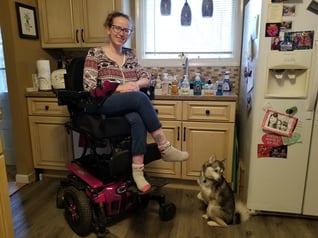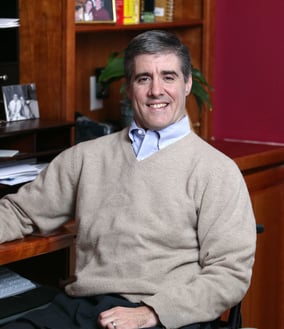Early Days: How COVID-19 is Changing Life for People L - Reeve Foundation
Public health measures meant to slow the spread of COVID-19 have upended daily life for millions of people around the world. The resulting challenges, from adapting to social distancing to easily accessing medical supplies, are multiplied for individuals living with paralysis.
 Stephanie Woodward, an attorney living in western New York, grew concerned about COVID-19 at the end of February. Both Woodward and her fiancé Ryan have spina bifida, and she realized they needed to be prepared for uncertain days ahead. They stocked the pantry, ordered a 30-day supply of medicine and began limiting their interactions with others: No hugs and kisses, no going out for Ryan’s birthday.
Stephanie Woodward, an attorney living in western New York, grew concerned about COVID-19 at the end of February. Both Woodward and her fiancé Ryan have spina bifida, and she realized they needed to be prepared for uncertain days ahead. They stocked the pantry, ordered a 30-day supply of medicine and began limiting their interactions with others: No hugs and kisses, no going out for Ryan’s birthday.
While Woodward is upbeat, she worries about what will happen when their medicines need to be replenished and whether Ryan will be able to get the specific catheter he needs. He has also been receiving care at a local pressure wound clinic. They wonder if it’s safe to keep going – but also whether it’s safe to stop.
“I’ve seen what pressure sores can do to people,” she said. “And pressure sores mixed with anything else makes me nervous.”
They are not alone. Similar concerns about accessing critical medicines and supplies, and safely visiting doctors for necessary procedures, are being shared on message boards within the community. On one private Facebook group for women with spinal cord injuries, posts about how to ensure home health aides are practicing social distancing were discussed, along with how to weigh what medical appointments to keep to minimize the risk of exposure.
“Surviving SCI/D for 40-years only to be wiped out by a damn germ: That’s sarcasm, but reality,” one woman wrote.
As the known cases of COVID-19 continue to increase, health experts are especially concerned for older people and those with underlying health conditions who are at most risk for developing severe cases.
 Because of this, Bill Cawley, director of the Christopher & Dana Reeve Foundation’s Peer and Family Support Program, made the difficult decision to ask his wife and four children to stay with friends as the crisis unfolds.
Because of this, Bill Cawley, director of the Christopher & Dana Reeve Foundation’s Peer and Family Support Program, made the difficult decision to ask his wife and four children to stay with friends as the crisis unfolds.
“For me to say to my family, ‘I need you to pack up and leave because there’s a chance I could catch it’ was really hard,” he said. “But it made sense.”
Cawley is paralyzed from the chest down. Like many people with spinal cord injuries, he is prone to the kind of secondary conditions, including reduced lung capacity and diaphragmatic issues, that increase his risk of developing a severe case of COVID-19. To stay connected, he and his family are talking on the phone and Skyping; on a recent sunny day, when the kids gathered outside to play basketball, he parked his wheelchair more than six-feet away to watch them play and visit with his wife.
“You can find ways to spend time together,” he said. “Just think creatively and be smart.”
As daily life continues to shift during the outbreak, Cawley urges everyone, whether separated from their families or not, to connect with support networks, including the Reeve Foundation’s Peer and Family Support Program.
“Peer mentors are not just there to help you make decisions on what wheelchair to get, but to support you in any way they can,” he said. “Right now - for anyone on their own, who can’t go outside, who are wondering who to connect with - having someone dealing with the same situation, at the same time, can be a big help. A peer mentor can relate.”
Keeping a sense of humor helps, too. Woodward collected all the random soaps she’d received last Christmas and created a ‘soap buffet’ in the bathroom.
“We’re going to wash our hands a lot,” she said. “We might as well have some fun.”
Additional Resources:
Join Our Movement
What started as an idea has become a national movement. With your support, we can influence policy and inspire lasting change.
Become an Advocate